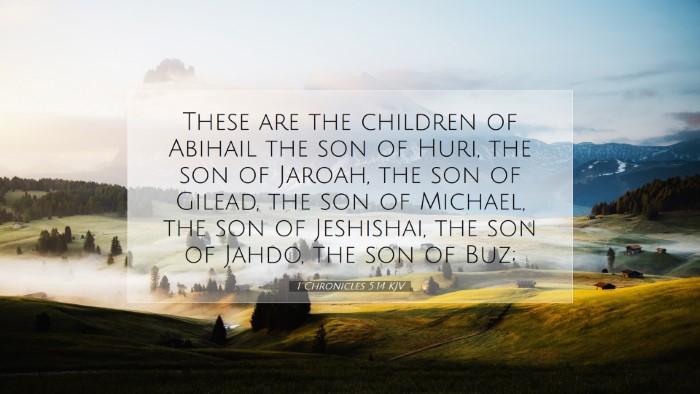Commentary on 1 Chronicles 5:14
1 Chronicles 5:14 states, "These are the children of Ahijah; and they are valiant men of might in their generations; and they were heads of the houses of their fathers." This verse highlights a significant aspect of the genealogical records within the Book of Chronicles, which primarily focuses on the tribes of Israel. The verse connects the lineage of the Reubenites with their warrior capabilities and their leadership roles, providing insight into the broader narrative of God’s covenant with Israel.
Genealogical Significance
The genealogies in the Chronicles take on a profound role, serving both spiritual and historical purposes. As Matthew Henry remarks, it emphasizes God’s faithfulness to His promises across generations. The specific mention of Ahijah’s descendants not only establishes their identity but also reinforces the significance of their contributions to Israel's tribe of Reuben.
The Character of the Descendants
1 Chronicles 5:14 notes that they were “valiant men of might.” The term "valiant" denotes strength and courage, reflecting attributes considered crucial for leadership in ancient Israel. Albert Barnes elaborates on the concept of being a “man of might,” indicating that it refers not only to physical prowess in battle but also to moral and spiritual strength. These individuals exemplified the warrior spirit, necessary for maintaining their tribal integrity in a tumultuous time.
Leadership and Authority
The phrase “heads of the houses of their fathers” signifies a leadership structure that is often mirrored in ancient Near Eastern societies. Adam Clarke interprets this as an affirmation of familial authority and responsibility. Each head was tasked with the stewardship of his household and the moral guidance of his clan. This hierarchical structure suggests that leadership in Israel was rooted deeply within familial ties, emphasizing a communal responsibility over individual achievement.
The Context of the Reubenites
Understanding the broader context of the Reubenites is crucial for interpreting this verse. The Reubenites, being the firstborn tribe, held a prominent position in Israel. However, their historical narrative is marked by challenges and a loss of primacy due to their actions, as recorded in Genesis 49:2-4, where Jacob speaks of Reuben’s instability. This background sheds light on the importance of these valiant men in seeking to restore their tribe's stature.
Theological Implications
The mention of the Reubenites in Chronicles has deeper theological implications. It reflects God’s commitment to restoring and preserving His people, even those who have faltered. The commentaries by Henry suggest that despite their failings, God’s covenant and mercy allow for redemption and notable contributions to the nation. This can serve as encouragement for contemporary believers, reminding them of the possibility of restoration and usefulness in God’s kingdom.
Application for Today
For pastors, students, and theologians, this verse and its commentary invite reflection on the importance of legacy and character in leadership. In the modern context, the attributes of courage and moral strength are vital in both spiritual and secular leadership. The reminder of communal responsibility prevalent in the families of these valiant men calls today's leaders to foster a sense of accountability and stewardship within their communities.
Conclusion
1 Chronicles 5:14 serves as a significant marker in understanding the lineage and identity of the Reubenites. As highlighted in the public domain commentaries by Matthew Henry, Albert Barnes, and Adam Clarke, it reflects themes of strength, leadership, and the enduring nature of God's faithfulness to His people. The insights gained from this verse remind believers of their historical roots and the call to embody strength and character in their respective lives.


